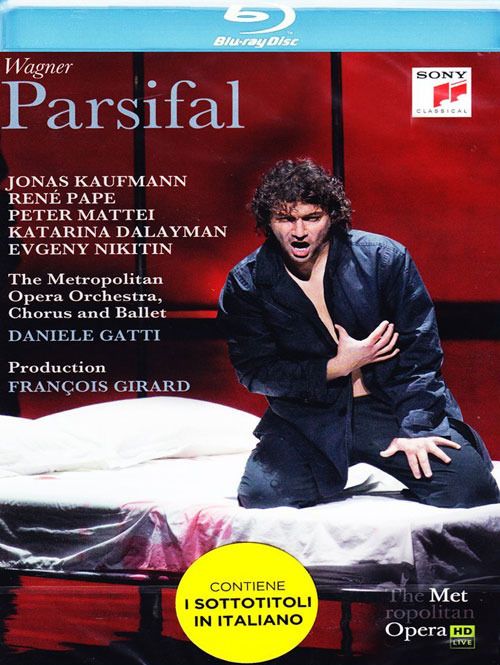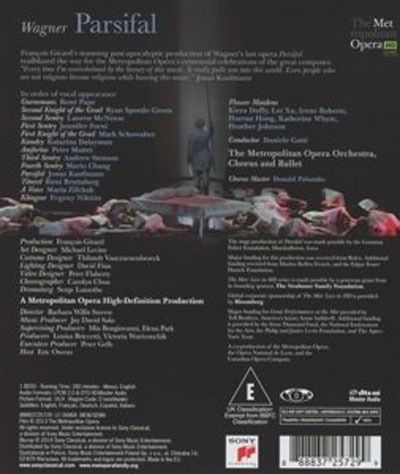Wagner: Parsifal / Kaufmann, Pape, Gatti, Met Opera [Blu-ray]
Conductor: Daniele Gatti | Composer: Richard Wagner | Director: Francois Girard | Performers: Katarina Dalayman, René Pape, Jonas Kaufmann, Peter Mattei | Orchestra/Ensemble: Metropolitan Opera Chorus, Metropolitan Opera Orchestra | Label: Sony | Blu-ray | Picture format: 16:9, Full HD | Sound format: PCM Stereo / Dolby Digital 5.1 / DTS 5.1 | File host: Share-online.biz | 5% recovery record + 1 .rev file |
Run time: 271 minutes | 49.03 GB
Language(s): German | Subtitle(s): Italian, English, German, Spanish, French
Conductor: Daniele Gatti | Composer: Richard Wagner | Director: Francois Girard | Performers: Katarina Dalayman, René Pape, Jonas Kaufmann, Peter Mattei | Orchestra/Ensemble: Metropolitan Opera Chorus, Metropolitan Opera Orchestra | Label: Sony | Blu-ray | Picture format: 16:9, Full HD | Sound format: PCM Stereo / Dolby Digital 5.1 / DTS 5.1 | File host: Share-online.biz | 5% recovery record + 1 .rev file |
Run time: 271 minutes | 49.03 GB
Language(s): German | Subtitle(s): Italian, English, German, Spanish, French

"There is much to admire in Mr. Girard’s thoughtful and intrepid staging, full of striking imagery. The blocking of the chorus, extras and dancers is theatrical and elegant. ... The Met has assembled about the best 'Parsifal' cast available today: the charismatic tenor Jonas Kaufmann sings the title role; the great bass René Pape is the veteran knight Gurnemanz, a role he owns; and the baritone Peter Mattei as Amfortas, in terrific voice, dares to bring out the rashness and inner desires of this stricken leader. The conductor Daniele Gatti draws diaphanous playing from the great Met orchestra and captures the shifting currents of this richly chromatic and complex score," The New York Times.
Watch a Trailer (sample is a lower resolution than actual DVD or Blu-ray):
REVIEW:
Robert Levine, ClassicsToday.com
Since Wieland Wagner’s “revolution” in staging, it is nearly impossible to watch a performance of Parsifal, unless it is done literally, following Wagner’s stage directions, without wondering what the opera is actually about. If it is a straightforward religious play, then so be it, but we rarely come across that anymore. Is it about Ritual, or should the very performance of it be seen as a ritual? Is it about the nature of prayer, salvation, and/or redemption? Is Nature a depiction of mankind’s inner life?
Working backward through these questions, the Metropolitan’s two-year-old production, by François Girard, certainly avoids the latter. Despite Wagner’s instructions, the landscape (sets by Michael Levy) consists of arid land and small mounds of earth, with a fissure of running water from the back of the stage to the footlights; once Amfortas arrives, it turns red and may be a metaphor for his wound made universal. There is no forest or lake in Act 1 or springtime in Act 3 (despite Gurnemanz’s statement to the contrary), and neither the first nor third act Transformation scene offers any physical transformation. Gurnemanz and Parsifal stroll—the Transformation is clearly inner.
Women are on stage but separated from the men by the crevice until it closes in Act 3 when Amfortas is healed, at which point the women join the men. Act 2 features the wound lengthwise, as a backdrop, looking for all the world like a giant vagina. The Flowermaidens (without a flower in sight), in white nightgowns, carry spears and sway seductively. The stage is awash in blood throughout the act; a bed appears and the sheets become saturated with it—the sign of women’s “curse” or Amfortas’ wound? In the opera’s final moments, Parsifal places the tip of the spear in the Grail cup—can we avoid the male-female imagery?
Stunning projections throughout the opera (by Peter Flaherty) that act as backdrops run the gamut from blood to parts of the solar system approaching dangerously close to the action, to what look like close-ups of flesh, to threatening weather systems, to a rather odd lava lamp. In a horrifying moment in Act 3, Amfortas crawls pathetically into Titurel’s grave. It is Kundry who opens the box containing the Grail and it is left open, for all to see. Was the fissure the crack in society?
Kundry’s death is peaceful and beautiful—she dies cradled in Gurnemanz’s arms. No one ever makes the sign of the Cross; this Parsifal is not specifically Christian. Dress is modern and simple: white shirts and dark pants for the men (they are seen taking off their ties and jackets during the Prelude), black or white dresses for the silent women. Parsifal returns in Act 3 utterly exhausted (his once black, curly hair now straight and graying). He is not a knight in armor come to heroically heal the world’s wound caused by the spear and, by association, by women; he does not bring springtime and renewal. He simply comes back to do his job, to perform a ritual that for some reason brings comfort to a group of men and women.
The production leans in the direction of the post-apocalyptic viewpoint of the opera as staged by Nicholas Lehnhoff (from Baden-Baden under Kent Nagano) that can be seen on an Opus Arte DVD. Clearly, the Knights (or Gentlemen) of the Grail are in a helpless, miserable situation, but they still insist on ceremony, which normally offers hope—that is why it is so popular in all religions. But there is no uplift, no feel of salvation at the end of Girard’s production; one remains intrigued, but, to use the vernacular, also “bummed out”. There may be a leader for the rite and some wounds have been healed, but the world outside is still barren. The Lehnhoff/Nagano ends with Kundry, still alive, leading Parsifal gently toward a bright light, and perhaps a new beginning. No such merriment here.
The singing at the Met is as fine as we might find anywhere. René Pape’s Gurnemanz is tireless and imposing; his soul-weariness in Act 3 (he, like Parsifal when he shows up, has aged considerably) is in his gait and in his sound until he realizes that Parsifal might solve the Knights’ problems, at which point some excitement re-enters his tone. Close-ups reveal a type of calculation on his part that you don’t sense from a distance in the theater, but it does not register poorly.
Jonas Kaufmann is a mostly quiet—introspective and unsure of himself—Parsifal, and dynamics aside, this is clearly Girard’s reading. Kaufmann’s soft singing is luscious and purposeful, devoid of affectation, but when he lets the voice out—as in “Amfortas! Die Wunde!”—he commands attention in an entirely different, very human way. It is a divinely beautiful performance. Almost stealing the show is Peter Mattei as Amfortas, whose agony and self-hatred are terrifyingly real. As penitence, one assumes, this Amfortas crawls more than he is carried, he pleads more than he rants; it is almost difficult to watch. Taken as Christian suffering—or any type of suffering—it is close to unbearable. Save for a couple of desperate high notes, soprano Katarina Dalayman as Kundry brings fine tone and a seductive air to the second act, but there is little chemistry between her and Kaufmann in this production: he puts his shirt back on when she appears, sensing danger, or something more maternal—very odd, indeed. Is it because he is more human or less human? Evgeny Nikitin’s snarling bass-baritone colors Klingsor’s music effectively but the character is not specifically drawn. Runi Brattaberg’s Titurel has innate nobility, his lines delivered at a snail’s pace.
It is hard to pinpoint precisely why Daniele Gatti’s leadership seems somewhat faceless. It may be that in keeping with the production’s refusal to answer any questions, he has decided to follow Girard’s lead rather than imposing an “interpretation”. The long, soft spells are almost languid, and the outbursts—even the last-act mania for the Knights—are never gigantic. (In the Lehnhoff/Nagano version they behave like desperate animals.) The Transformation scenes lack luminosity. Perhaps there is a reason why Amfortas’ scenes are the most penetrating; perhaps this is his story. The Met Orchestra and Chorus play and sing magnificently. You leave this performance wandering, like an imperfect fool, but fascinated.
Works on This Recording
1.
Parsifal by Richard Wagner
Performer: Katarina Dalayman (Soprano), René Pape (Bass), Jonas Kaufmann (Tenor), Peter Mattei (Baritone), Evgeny Nikitin (Bass)
Conductor: Daniele Gatti
Orchestra/Ensemble: Metropolitan Opera Chorus, Metropolitan Opera Orchestra
Period: Romantic
Written: 1877-1882; Germany
 No Password
No Password


0 comments:
Post a Comment